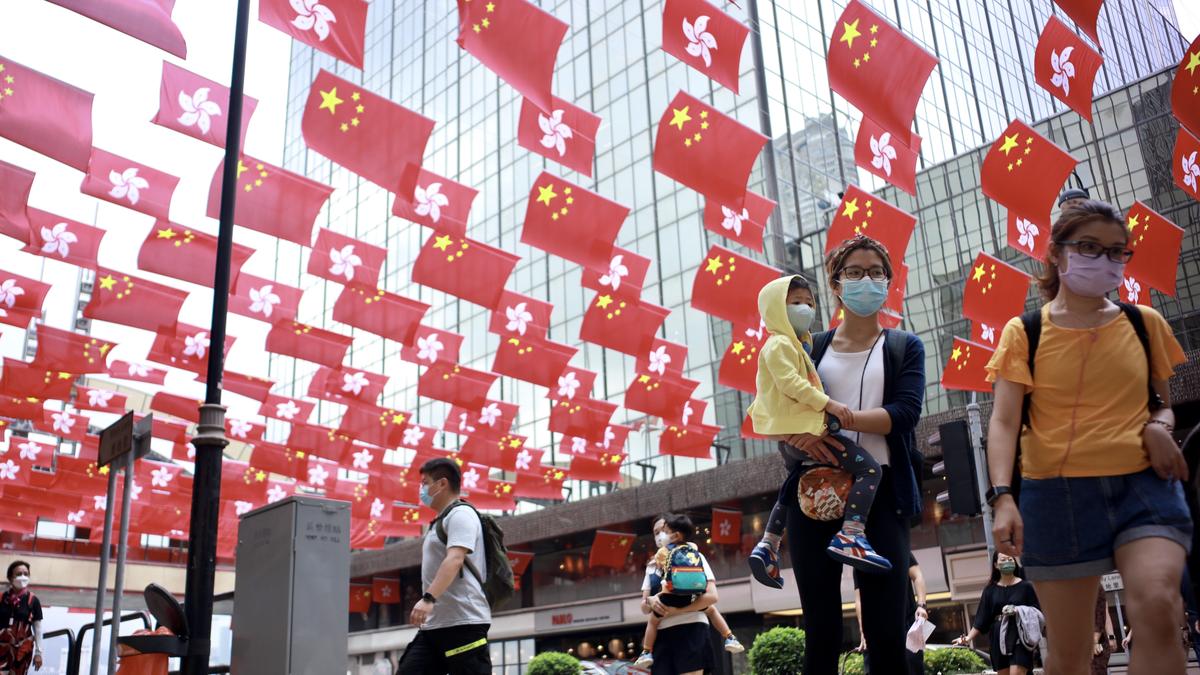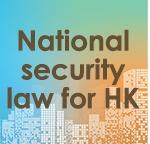 A video on promoting National Security Law is being played at Pui Kiu Middle School on Oct 6, 2020, in Hong Kong. (PHOTO / XINHUA)
A video on promoting National Security Law is being played at Pui Kiu Middle School on Oct 6, 2020, in Hong Kong. (PHOTO / XINHUA)
HONG KONG - It has been a year since Chan Tze-chin, a Hong Kong lawyer in his 40s, was chased down the street by an angry mob, and the scars are still prominent on his neck and hands. He had berated a gang of black-clad rioters for their disorderly behavior as shops were trashed and fires lit in a busy shopping area.
In a recent interview, Chan told Xinhua that while the memories remained, he no longer lived in fear.
"Now, I don't worry about being assaulted every day. A year ago, I could not leave home alone," he said. "The National Security Law in Hong Kong is definitely good for me."
The law took effect on June 30 last year, following prolonged social unrest in 2019, and has restored freedom from fear to the vast majority of Hong Kong's people. This, according to University of Hong Kong law professor Richard Cullen, has been one of the core elements of change in the city over the past year.
ALSO READ: Top HK officials praise National Security Law one year on
Cullen was there and saw for himself "a very violent and terrifyingly damaging and destructive insurrection" in 2019.
The law has played a major role in bringing stability back to Hong Kong and it is without question a very positive improvement.
Richard Cullen, Law professor at the University of Hong Kong
Renowned for the safety and freedom of its residents, the metropolis was gripped by chaos one and a half years ago, when protesters hurling petrol bombs and besieging police stations were almost daily routine. In the fallout, society was divided and the economy went into recession.
"The law has played a major role in bringing stability back to Hong Kong and it is without question a very positive improvement," Cullen said.
According to a survey by local think-tank Bauhinia Institute in April, close to 80 percent of residents believe Hong Kong is more peaceful since the national security law. In the first quarter of this year, crime was down about 10 percent.
Following the new law, the central and local authorities also improved Hong Kong's electoral system earlier this year.
Paul Chan Mo-po, financial secretary of the Hong Kong Special Administrative Region government, has said that restoration of stability, by the enactment of the national security law and improvements to the electoral system, has created a safe and secure environment for international businesses and investments.
READ MORE: Official: HK may lose its glamor without National Security Law
Fabrizio Goldoni, an Italian expatriate in Hong Kong, expects his investment and trade company to bounce back this year from the double whammy of social unrest and COVID-19.
He also witnessed the 2019 chaos, in which his business was threatened. "Traffic was often paralyzed by rioters; I could not even go to work. My office was sometimes closed due to the riots."
While the instability once made him pessimistic, Goldoni's confidence has returned along with peaceful streets, and optimism now reigns in business.
 People cross a street decorated with the national flags and Hong Kong Special Administrative Region flags in Tsim Sha Tsui East, Hong Kong, on June 29, 2021. The flags were put up in celebration of the 24th anniversary of Hong Kong's return to the motherland. (EDMOND TANG / CHINA DAILY)
People cross a street decorated with the national flags and Hong Kong Special Administrative Region flags in Tsim Sha Tsui East, Hong Kong, on June 29, 2021. The flags were put up in celebration of the 24th anniversary of Hong Kong's return to the motherland. (EDMOND TANG / CHINA DAILY)
The economy got off to a good start in the first quarter with a 7.9 percent year-on-year increase in GDP, ending six quarters of contraction.
Finance performed even better than the wider economy. Despite lingering rumors of fund outflows, about US$50 billion flowed to the banking system as of the end of last year. In the first quarter, Hong Kong Exchanges and Clearing Limited (HKEX) came third globally in terms of IPOs.
Hong Kong remains a highly competitive and attractive global financial center, HKEX chief executive Nicolas Aguzin said. Last year, of Hong Kong's 9,000 overseas and mainland companies, 1,500 had their regional headquarters in the city.
Observers said its unique advantages under "one country, two systems", including the free flow of information, people and capital, keep Hong Kong thriving as an East-and-West bridge 24 years after returning to the motherland
A stable and predictable environment is necessary for Hong Kong to flourish.
READ MORE: National Security Law gives HK bright future
Observers said its unique advantages under "one country, two systems", including the free flow of information, people and capital, keep Hong Kong thriving as an East-and-West bridge 24 years after returning to the motherland.
As the world struggles with COVID-19, Hong Kong has benefited from the resilience of mainland markets and will continue to do so in the foreseeable future, Liang Haiming, a Hong Kong-based economist, said.
The 14th Five-Year Plan for national economic and social development encourages Hong Kong to sharpen its financial edge, and do more in terms of innovation and technology and intellectual property trading, among others. "It is like the expressway leading to sustained success has been paved and Hong Kong just needs to drive along it," Liang said.
In less than a year, there will be three major elections, the election of the Election Committee, the election of the Legislative Council and the election of the chief executive.
Cullen expects the process to proceed smoothly and efficiently. "I hope Hong Kong will get back on track and start addressing and solving some major social problems, particularly housing," he said.
Battered, but not broken, Chan Tze-chin believes that with national security law and an improved electoral system, Hong Kong will move in a more positive direction, and society must come together, heal divisions and focus on the future.
"I'm a father. I want my children to grow up in a safe, peaceful environment," he said.



